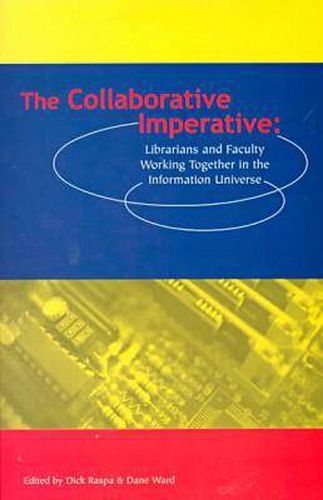Readings Newsletter
Become a Readings Member to make your shopping experience even easier.
Sign in or sign up for free!
You’re not far away from qualifying for FREE standard shipping within Australia
You’ve qualified for FREE standard shipping within Australia
The cart is loading…






This is a book about librarian and faculty collaboration–as it exists now and as it could exist. What is collaboration? How does it impact what librarians do? After defining collaboration as two or more people bringing their separate competencies to bear on a problem to work for a solution richer in options than might have been possible working alone, the authors assert that collaboration will be the next great transition in higher education.
In a series of essays, the possibilities of librarians working across disciplines and traditional university boundaries are explored, starting with the interpersonal aspects of collaboration. The focus is on developments within and beyond the instructional arena. A key idea is that collaboration is as much an issue of relationship building as it is one of specific initiative.
Included in this book are a review of the literature, case studies of exemplary programs at the institutional level, reports of surveys of informal collaborations, a directory of resources, as well as theoretical models of the collaborative enterprise.
The authors believe librarians are particularly suited for collaborative enterprise. They practice daily the kind of listening that requires them to translate for students and instructional faculty the questions they bring to the library. This book will challenge readers to risk engaging in the collaborative process at their institution.
$9.00 standard shipping within Australia
FREE standard shipping within Australia for orders over $100.00
Express & International shipping calculated at checkout
This is a book about librarian and faculty collaboration–as it exists now and as it could exist. What is collaboration? How does it impact what librarians do? After defining collaboration as two or more people bringing their separate competencies to bear on a problem to work for a solution richer in options than might have been possible working alone, the authors assert that collaboration will be the next great transition in higher education.
In a series of essays, the possibilities of librarians working across disciplines and traditional university boundaries are explored, starting with the interpersonal aspects of collaboration. The focus is on developments within and beyond the instructional arena. A key idea is that collaboration is as much an issue of relationship building as it is one of specific initiative.
Included in this book are a review of the literature, case studies of exemplary programs at the institutional level, reports of surveys of informal collaborations, a directory of resources, as well as theoretical models of the collaborative enterprise.
The authors believe librarians are particularly suited for collaborative enterprise. They practice daily the kind of listening that requires them to translate for students and instructional faculty the questions they bring to the library. This book will challenge readers to risk engaging in the collaborative process at their institution.